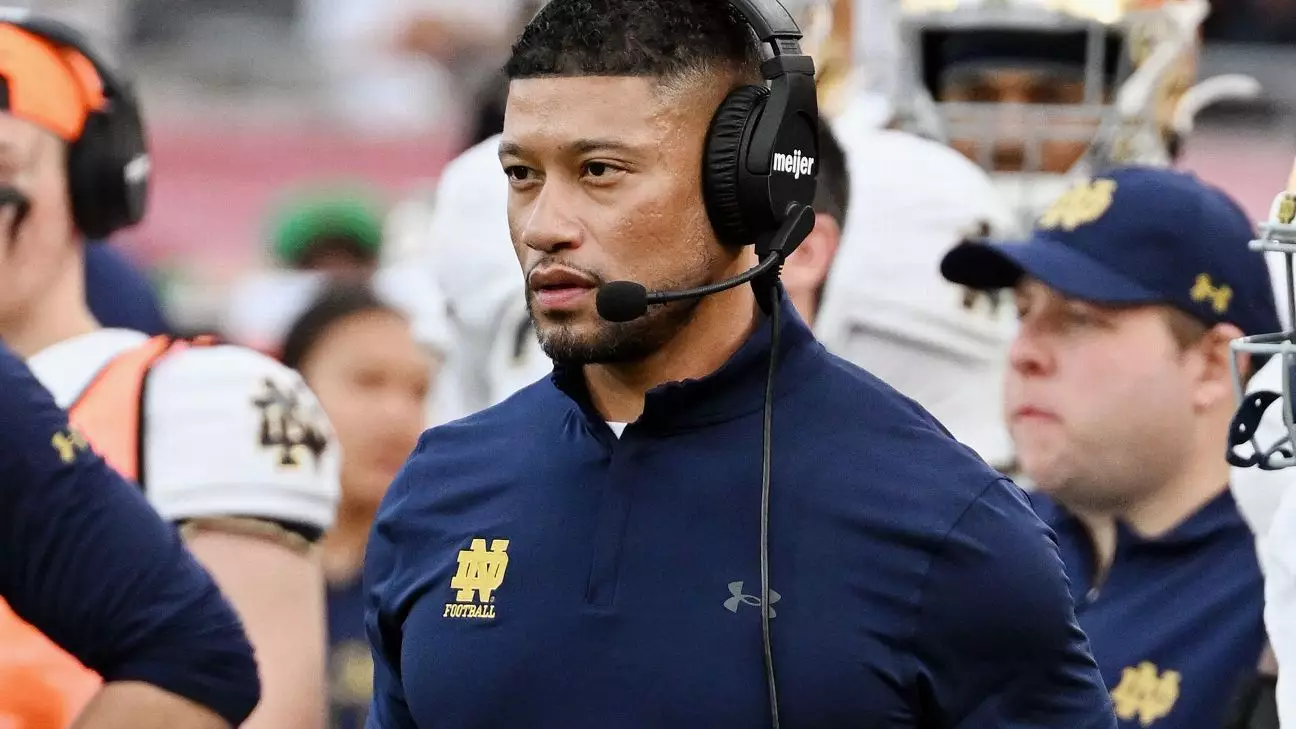In the realm of college football, significant moments are often overshadowed by the relentless pursuit of championship titles and statistical achievements. However, the upcoming College Football Playoff Semifinal at the Capital One Orange Bowl between Notre Dame and Penn State is distinctly poised to mark a pivotal milestone in the history of the sport. The matchup, featuring Marcus Freeman of Notre Dame and James Franklin of Penn State, is set to determine which coach will ascend to the national championship game, potentially becoming the first Black head coach to achieve that honor. This not only signifies a personal triumph for the individuals involved but also serves as a beacon of hope and inspiration for aspiring coaches from diverse backgrounds.
Both coaches were recently given the platform to reflect on the importance of their potential achievement. Franklin drew parallels with Super Bowl XLI, where he witnessed Tony Dungy and Lovie Smith become the first Black head coaches to face off in a Super Bowl. Franklin recalled his time as an offensive coordinator at Kansas State, under Ron Prince, another representative in the coaching community of color. “I remember thinking that as a coach, how significant that was in the profession,” Franklin said. This reflection underscores a collective journey toward diversity and inclusivity that has been underway for years in coaching.
Franklin’s insights reveal the seriousness with which he views this occasion—not merely for personal recognition but as an opportunity to uplift the profession as a whole. He emphasized that the landscape has evolved from six Black head coaches in college football to sixteen today, asserting that this gradual progression is noteworthy, regardless of perceptions about its pace. “At the end of the day, you just want an opportunity,” he stated, capturing the essence of what it means to strive for greater representation in any profession, including athletics.
Contrasting with Franklin’s reflections, Freeman brought his own nuanced view to the conversation, rooted in a dual cultural heritage. Describing himself as half-Korean, Freeman’s acknowledgment of his background highlighted the multifaceted nature of representation in coaching. He recognized that, for various individuals looking up to him and Franklin, their roles transcend the confines of the football field. “It’s a reminder that you are a representation for so many others that look like you,” Freeman articulated, revealing a deep understanding of the responsibility that comes with his position.
Freeman’s aspirations are not solely anchored in personal achievement; he prioritizes team success and collective glory. He stated, “Now, with that being said, it’s not about me. It’s about us.” This selfless approach emphasizes a broader commitment to mentoring his players and younger coaches alike, which reflects an ethos of leadership that extends beyond tactical prowess.
When discussing his potential influence on upcoming generations, Freeman pivoted towards actionable measures for fostering growth among young coaches. “If you want to impact the young people in this profession, you probably should do things to help them,” he asserted. This proactive stance illustrates his recognition that representation in leadership roles must be coupled with tangible support for growth, networking, and mentorship.
Both coaches are acutely aware that their paths are laden with significant implications. Franklin expressed gratitude for the opportunity to compete against Freeman, underscoring his desire to represent not just Penn State but the broader community of young men who look up to him. “I’m honored to be able to compete against Notre Dame,” he remarked, showcasing a mutual respect for their respective journeys.
As they head into this significant matchup, Freeman and Franklin stand at the intersection of personal ambition and historical significance. Their potential to become the first Black head coach to lead a team to the national championship game encapsulates years of advocacy for diversity and equality within college sports. This moment is not merely about two teams vying for a title; it represents a collective step toward breaking barriers and paving pathways for future generations in coaching and leadership.
Ultimately, whether Notre Dame or Penn State emerges victorious, the repercussions of this game will resonate far beyond the scoreboard or the title. In the broader context of sports culture, it anchors the ongoing conversation about race, opportunity, and representation in coaching, ensuring that the legacy of both Freeman and Franklin will inspire many long after the final whistle has blown.


Leave a Reply